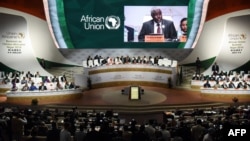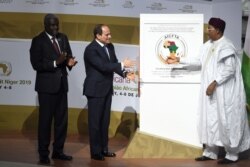Updated July 7, 5:20 pm
Africa is about to enter into what could be an era of peace and prosperity with the official launch of a continental trade agreement.
Nigeria -- Africa's biggest economy -- and Benin signed on to the new African Continental Free Trade Area Sunday at an African Union summit in Niger. This leaves only Eritrea as the only AU nation still yet to join the pact.
If successful, experts predict a $3.4 trillion free trade bloc, leading to jobs and development.
"An old dream is coming true, the founding fathers must be proud," African Union commission chairman Moussa Faki Mahamat said Sunday while AU Chairman and Egyptian President Abdel Fattah al-Sissi said "The success of AfCFTA will be the real test to achieve economic growth that will turn our people's dream of welfare and quality of life into a reality."
It took 17 years of bitter and tough negotiations to reach Sunday's milestone, which experts say could boost trade among African nations by 60% in just three years.
But those experts also understand that the continent is facing many challenges, including unreliable or non-existent roads and rail lines, unrest, corruption, and deeply entrenched bureaucracies.
By integrating economies and reducing such trade barriers as tariffs, the pact aims to increase employment prospects, living standards and opportunities in Africa, and to make Africans more competitive regionally and globally.
Nigeria's willingness to sign the pact, along with the Economic Community of West African States (ECOWAS) agreement last week to adopt a common currency, will help boost trade throughout the continent, says Mohamed Ibn Chambas, the U.N. secretary-general's special representative and head of the UN office for West Africa and the Sahel (UNOWAS).
"The continental free trade area will to a large extent also reinforce regional free trade areas," Chambas told VOA. "And this is where a common currency comes in. If you have a free trade area and it is matched also by a regional common currency, the impact of course will be to boost both free trade and easy commerce within the area."
The African free trade zone has been under discussion since 2002, with a draft deal signed in early 2018. In May, it surpassed a threshold of ratification by at least 22 member countries' legislatures.

